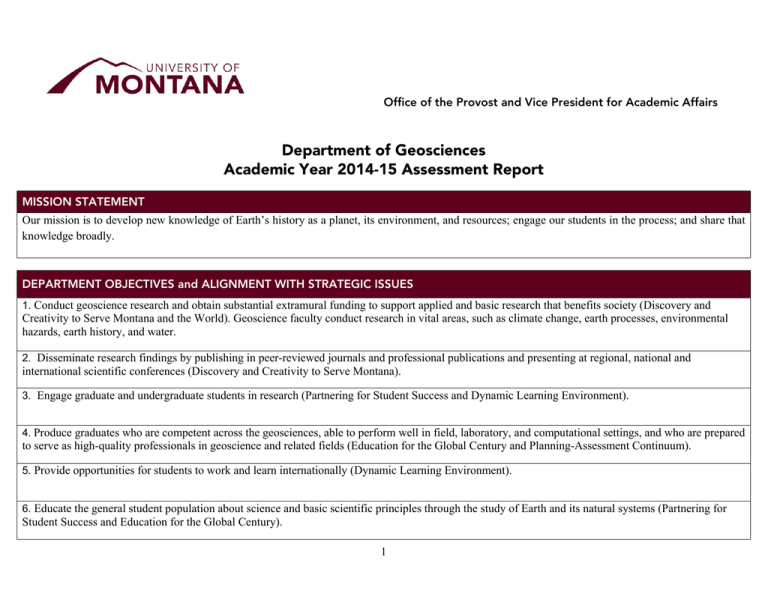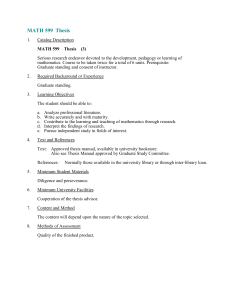Department of Geosciences Academic Year 2014-15 Assessment Report
advertisement

Office of the Provost and Vice President for Academic Affairs Department of Geosciences Academic Year 2014-15 Assessment Report MISSION STATEMENT Our mission is to develop new knowledge of Earth’s history as a planet, its environment, and resources; engage our students in the process; and share that knowledge broadly. DEPARTMENT OBJECTIVES and ALIGNMENT WITH STRATEGIC ISSUES 1. Conduct geoscience research and obtain substantial extramural funding to support applied and basic research that benefits society (Discovery and Creativity to Serve Montana and the World). Geoscience faculty conduct research in vital areas, such as climate change, earth processes, environmental hazards, earth history, and water. 2. Disseminate research findings by publishing in peer-reviewed journals and professional publications and presenting at regional, national and international scientific conferences (Discovery and Creativity to Serve Montana). 3. Engage graduate and undergraduate students in research (Partnering for Student Success and Dynamic Learning Environment). 4. Produce graduates who are competent across the geosciences, able to perform well in field, laboratory, and computational settings, and who are prepared to serve as high-quality professionals in geoscience and related fields (Education for the Global Century and Planning-Assessment Continuum). 5. Provide opportunities for students to work and learn internationally (Dynamic Learning Environment). 6. Educate the general student population about science and basic scientific principles through the study of Earth and its natural systems (Partnering for Student Success and Education for the Global Century). 1 DEPARTMENT OBJECTIVES and ALIGNMENT WITH STRATEGIC ISSUES 7. Inform the public about important geoscience issues through outreach (Discovery and Creativity to Serve Montana and the World). STUDENT LEARNING GOALS AND MEASUREMENT TOOLS – UNDERGRADUATE PROGRAM UNDERGRADUATE PROGRAM BS 1. Apply scientific methods, technical knowledge, Pre and post Knowledge Survey YES and appropriate analytic tools relevant to geosciences to address problems of societal importance BS 2. Apply creative and critical thinking skills YES Audience Evaluations Graduating Seniors Focus Group Graduate Exit Survey YES YES Detailed Curriculum Review YES YES YES BS 3. Communicate effectively and professionally through oral, written, and graphical means and operate effectively both in individual and teamrelated activities. BS 4. Understand and practice ethical conduct in geoscientific endeavors STUDENT LEARNING GOALS AND MEASUREMENT TOOLS – GRADUATE PROGRAM GRADUATE PROGRAM Comprehensive Exam Thesis Proposal MS 1. Demonstrated knowledge in the core discipline YES MS 2. Ability to critically read and critique cutting edge research YES articles 2 Thesis Presentation Thesis Committee and Written Thesis YES YES YES STUDENT LEARNING GOALS AND MEASUREMENT TOOLS – GRADUATE PROGRAM GRADUATE PROGRAM Comprehensive Exam Thesis Proposal Thesis Presentation Thesis Committee and Written Thesis MS 4. Demonstrated ability to carry out scientific research YES YES MS 5. Ability to analyze, interpret, and integrate diverse datasets relevant to the core discipline YES YES MS 6. Understand the role of geoscience in the global societal YES YES YES YES YES YES YES YES YES MS 3. Articulate in a written proposal the formulation of a scientific problem and the design of a strategy for addressing it context YES PhD 1. Use cutting-edge knowledge of, and technical skills in, a chosen core discipline as part of an academic and/or professional career in the geosciences PhD 2. Create new knowledge by collecting and interpreting geoscience data and communicating results to the professional society PhD 3. Communicate effectively and professionally through oral, written, and graphical means YES YES YES YES PhD 4. Participate effectively in the workplace and in individual and team-related activities YES PhD 5. Have the broad general education and an integrated knowledge needed to appreciate the role of geoscience in the global societal context PhD 6. Conduct scientific work in an ethical and professional manner YES YES 3 YES RESULTS AND MODIFICATIONS Curriculum review to ensure Detailed curriculum map revealed deficiencies in undergraduate programming. These deficiencies were undergraduate students can apply scientific addressed through curriculum adjustments. methods, technical knowledge, and appropriate analytic tools relevant to geosciences to address problems of societal importance Graduate exit survey indicated undergraduate students are most knowledgeable about earth history and least knowledgeable about economic geology when they graduate. At the time these results were collected, economic geology had only recently been added back into the curriculum. Although not re-surveyed yet, Geosciences expects knowledge of economic geology has increased more recently. All learning goals for Geosciences graduate program (both MS and PhD) are addressed through the thesis/dissertation process: thesis proposal (reviewed by all faculty), thesis presentation (reviewed by department), written thesis (reviewed by committee), and thesis exam (conducted by committee). Assessment method was modified to include audience evaluation of the quality of the MS thesis or PhD dissertation presentation. APPENDICES 1. Curriculum map for undergraduate degrees. FUTURE PLANS FOR CONTINUED ASSESSMENT 1. Use curriculum map to adjust course content to combine courses for efficiency. 2. Continue to use indirect assessment tools to evaluate student learning, i.e., graduate surveys, audience surveys, graduate focus groups. 3. Ensure all data relevant to direct assessment is collected for required courses and for rotating upper-division courses. 4 5 GEOSCIENCES CURRICULUM MAP Req. Course # Course Name Outcome 1: Broad general knowled ge of geoscien ces Outcome 2: Basic scientific and mathema tical compete nce Outcome 3: Basic critical thinking and problem solving skills Outcome 4: Field and laboratory technical competen ce Outcome 5: Informati onal literacy Outcome 6: Compete nce in communi cation 101 102 Intro Intro Lab Oceang raphy History of Life Climate Change EHist EMat Surf Proc Field Meth Sci Soc IgMetP et Sed Strat Paleobi ology Structu ral Geo Geoche m Global Bio/Ge o Hydoge ology IA I D I D I I I I Outcome 7: Demonstr ated profession al and ethically‐ responsibl e conduct I I I I I I A I I I I I I D D D D D D I D I D I I I D I D M M M M D D D M I D M D D M D D D D M D D D D D D D D D M D M D D D D D D D D M D M D M M M D D M M D 105 106 108 200 225 228 231 304 305 309 311 315 327 408 420 GEOSCIENCES CURRICULUM MAP Req. Course # Course Name Outcome 1: Broad general knowled ge of geoscien ces Outcome 2: Basic scientific and mathema tical compete nce Outcome 3: Basic critical thinking and problem solving skills Outcome 4: Field and laboratory technical competen ce Outcome 5: Informati onal literacy Outcome 6: Compete nce in communi cation 421 426 Hydrol SEdGe o Field2 Field Camp Tectoni cs Applie d Magne tics Subsurf ace Imagin g Sed Arch SedPet petrole um geo Proc Geomo rpholo gy Global Climate Snow, ice and climate Quant Analysi s Thesis D M M A M DA D MA D A D A Outcome 7: Demonstr ated profession al and ethically‐ responsibl e conduct D D M D M M D M I D I I M D M D M A M A A A D M M A M D A A A D M M M M M M M M D D D D M M M M M M M M M 429 433 435 436 442 443 451 460 482 488 491 499 GEOSCIENCES CURRICULUM MAP Req. Course # Course Name Outcome 1: Broad general knowled ge of geoscien ces Outcome 2: Basic scientific and mathema tical compete nce Outcome 3: Basic critical thinking and problem solving skills Outcome 4: Field and laboratory technical competen ce Outcome 5: Informati onal literacy Outcome 6: Compete nce in communi cation 320 Hydroc hem ‐ Global Water M D M D M M Outcome 7: Demonstr ated profession al and ethically‐ responsibl e conduct M

